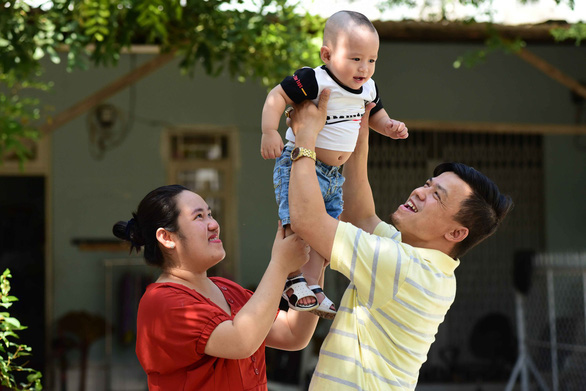Dozens of children in Vietnam have been born to infertile parents under a program that pays for the costs of the expensive in vitro fertilization (IVF) treatment for low-income couples who struggle to conceive naturally.
The annual program, known as ‘Uom mam hanh phuc’ (Sowing Happiness), was launched in 2014 by Prof. Dr. Nguyen Thi Ngoc Phuong, who spearheaded the introduction of IVF treatment in Vietnam in the late 1990s.
Each year, organizers select from hundreds of applications and provide financial as well as medical support to some dozen couples who need help the most.
Selected couples are sponsored for all steps of a standard IVF treatment, which is a process of fertilizing an egg with sperm outside of the body.
This treatment involves monitoring and stimulating a woman's ovulatory process, removing ova from the woman's ovaries, letting sperm fertilize them in a laboratory, and implanting the resultant embryo in the female’s uterus.
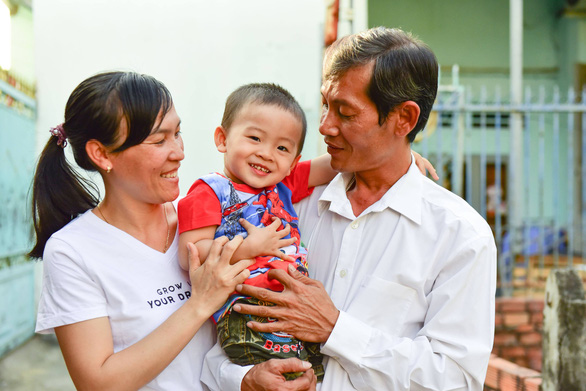 |
| A couple plays with their child born through in vitro fertilization sponsored by a program that supports infertile couples in Vietnam. Photo: Huu Thuan / Tuoi Tre |
According to Dr. Dang Quang Vinh, deputy director of My Duc General Hospital in Ho Chi Minh City that provides the treatment, selected couples will have all their medical costs covered, including those of storing unused embryos, which can be accessed for future IVF attempts.
Under this program, each couple can save up to VND80-100 million (US$3,500 - 4,300) per attempt.
As of the time of writing, 80 children have been born to parents who underwent IVF treatment sponsored by the program, while six mothers are expected to give birth through IVF treatment soon.
This year, on its fifth annual call for candidates, the program has received 621 applications from infertile couples from across the country and selected 167 satisfying all criteria laid out by the organizers.
“As our funds are limited, we have no choice but to give priority to couples who are in most dire need of financial support,” said Dr. Vinh said.
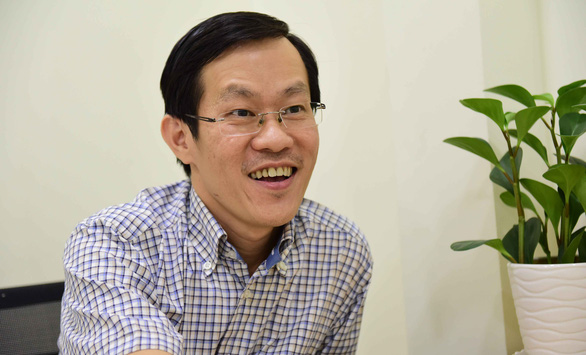 |
| Dr. Dang Quang Vinh, vice-director of My Duc General Hospital in Ho Chi Minh City. Photo: Huu Thuan / Tuoi Tre |
The program is funded by donations from My Duc General Hospital employees and philanthropists. In 2017, VND2.7 billion ($116,000) was raised from these donations to help 33 couples selected for the fourth edition of the program.
“It pains us every time we have to reject an application,” he said.
The birth of ‘Treasure’
Hoang Van Hung, 36, and his wife Huynh Kim Hue, 29, who live in a small house in District 12, Ho Chi Minh City, were one of the 86 couples who were blessed with a child after being chosen for the program.
The couples’ dream of having a child became more and more far-fetched as they still struggled to conceive years after getting married.
Hue managed to get pregnant after their first attempt at seeking medical intervention by manually inserting her husband’s semen into her uterus, but their unborn child was pronounced dead by doctors eight weeks into her pregnancy.
After spending some time getting over the shock of their first child’s death, Hung and Hue sought help from private clinics multiple times to no avail.
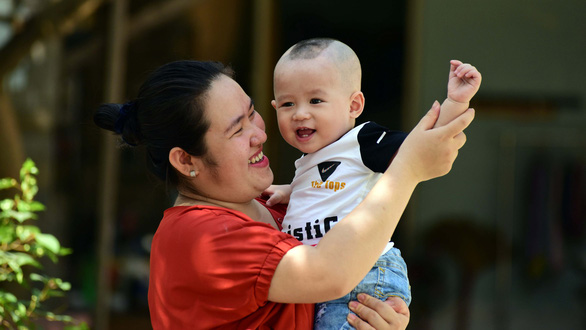 |
| Huynh Kim Hue plays with her first child born through in vitro fertilization sponsored by a program that supports infertile couples in Vietnam. Photo: Duyen Phan / Tuoi Tre |
Financially exhausted, the couple decided to apply for the third edition of the ‘Uom mam hanh phuc’ program and got selected to undergo free IVF treatment at My Duc General Hospital.
It was Dr. Vuong Thi Ngoc Lan, Dr. Phuong’s daughter, who implanted the lab-cultured embryo into Hue’s uterus.
The couple’s happiness doubled when the first ultrasound result came out, showing that Hue had conceived twin babies.
However, one of the babies was pronounced dead after only 11 weeks.
Following this incident, Hung told Hue to refrain from all labor activities and to spend her days watching comedies to stay in a good mood.
Hue gave birth to the remaining twin on October 15, 2016 after 37 weeks of pregnancy. The couple had asked doctors to perform a C-section three weeks earlier than the expected date for fear of another miscarriage.
“It was only after hearing our child’s first cries that we could breathe a sigh of relief,” Hung said.
“It was a special moment that we wouldn't ever be able to forget.”
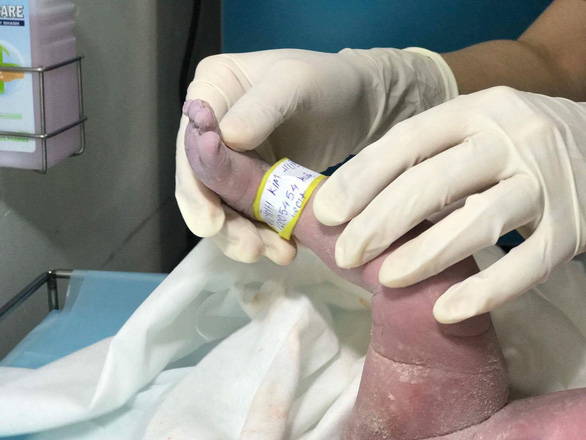 |
| A medical worker tends to the first child of Hoang Van Hung and Huynh Kim Hue after the boy is delivered at My Duc General Hospital in Ho Chi Minh City on October 15, 2016 in this photo provided by the couple. |
They named their first child Bao Lam, which translates as ‘treasure of the forest."
Now pregnant with her second child through IVF treatment, Hue said she and her husband could finally put an end to their restless search for a child which they had thought was without any hope.
Renewed hope
According to a 2018 research conducted on 14,300 married couples in Vietnam, 7.7 percent of the couples who were in childbearing age suffered from infertility.
The research estimated that around one million couples nationwide were infertile, half of which were under the age of 30.
Although the figure is not high when compared to the average global infertility rate of 6-12 percent as per WHO statistics, Dr. Phuong said it is alarming due to the fact that unhealthy lifestyles contribute much to infertility in Vietnam.
Heavy smoking and drinking habits affect one’s ability to conceive naturally, she added.
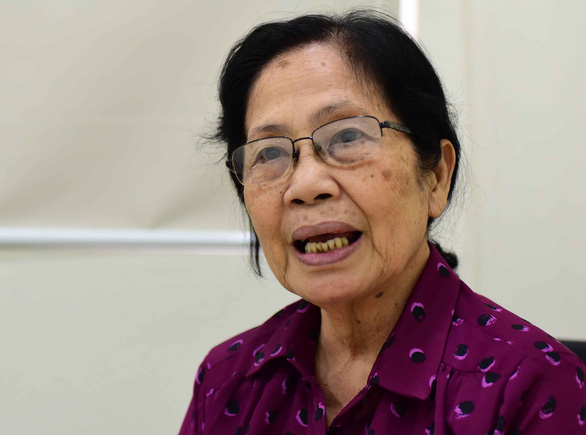 |
| Prof. Dr. Nguyen Thi Ngoc Phuong, former director of Tu Du Hospital in Ho Chi Minh City. Photo: Duyen Phan / Tuoi Tre |
More than 20 years since the first child was born through IVF in Vietnam in 1998, tens of thousands of children have been born thanks to this medical technique, Dr. Phuong said.
“Although the cost of IVF treatment in Vietnam is the lowest in the world, it’s still a huge expenditure for low-income couples,” Dr. Phuong said.
“If [all infertile couples in Vietnam] get access to free IVF treatment, around 70 percent of them will be able to conceive,” she added.
Dr. Phuong expressed her hope that IVF treatment will soon become available in each of Vietnam’s 63 provinces and municipalities so patients can cut down on their traveling and accommodation expenses.
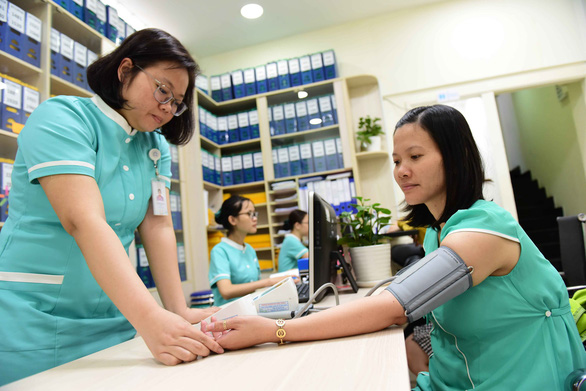 |
| An infertile patient undergoes a medical checkup at My Duc General Hospital in Ho Chi Minh City. Photo: Duyen Phan / Tuoi Tre |
Like us on Facebook or follow us on Twitter to get the latest news about Vietnam!



